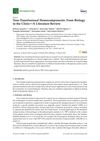 15 citations,
April 2022 in “Immunology”
15 citations,
April 2022 in “Immunology” Men and women get COVID-19 at similar rates, but men tend to get sicker and have a higher risk of dying, while women usually have stronger immune responses and vaccine reactions.
 15 citations,
August 2021 in “Reviews in endocrine and metabolic disorders”
15 citations,
August 2021 in “Reviews in endocrine and metabolic disorders” COVID-19 and hypopituitarism (reduced pituitary gland function) are linked, with the latter's related health issues potentially worsening COVID-19 outcomes, and COVID-19 possibly increasing risk for pituitary complications.
 13 citations,
August 2020 in “Frontiers in Immunology”
13 citations,
August 2020 in “Frontiers in Immunology” Gamma delta T cells in the skin help with healing and defense but can also cause autoimmune issues, and more research is needed to understand how they are activated.
 12 citations,
March 2018 in “Bioengineering”
12 citations,
March 2018 in “Bioengineering” The document concludes that products like PRP and PRF show promise for tissue healing, but evidence of their effectiveness is inconsistent.
 9 citations,
September 1999 in “Journal of the European Academy of Dermatology and Venereology”
9 citations,
September 1999 in “Journal of the European Academy of Dermatology and Venereology” Skin ulcers from interferon may not depend on the amount given.
 9 citations,
August 2018 in “JAAD Case Reports”
9 citations,
August 2018 in “JAAD Case Reports” Tofacitinib can temporarily improve hair growth in alopecia universalis, but its effectiveness may decrease over time.
 8 citations,
April 2020 in “Journal of Ethnopharmacology”
8 citations,
April 2020 in “Journal of Ethnopharmacology” Herbs might help with hair loss, but more research is needed to confirm their safety and effectiveness.
 7 citations,
June 2022 in “Frontiers in Medicine”
7 citations,
June 2022 in “Frontiers in Medicine” ADSC-derived extracellular vesicles show promise for skin and hair regeneration and wound healing.
5 citations,
October 2021 in “Clinical, cosmetic and investigational dermatology” Japanese patients with alopecia areata often have a higher BMI and consume more vitamin C, fruit, and retinol, which may affect their condition's development or severity.
 4 citations,
March 2018 in “Daehan han'yi hag'hoeji/Journal of Korean medicine”
4 citations,
March 2018 in “Daehan han'yi hag'hoeji/Journal of Korean medicine” Astragalus membranaceus helps regrow hair and reduce hair loss symptoms.
 2 citations,
December 2022 in “PNAS nexus”
2 citations,
December 2022 in “PNAS nexus” SCD-153 shows promise as an effective topical treatment for alopecia areata.
 2 citations,
March 2020 in “International Journal of Molecular Sciences”
2 citations,
March 2020 in “International Journal of Molecular Sciences” Topical treatments can deliver active molecules to skin stem cells, potentially helping treat skin and hair disorders, including skin cancers and hair loss.
 2 citations,
August 2019 in “Journal of skin and stem cell”
2 citations,
August 2019 in “Journal of skin and stem cell” The study concludes that regulating apoptosis could lead to new treatments for various skin and hair conditions.

research Skin
2 citations,
January 2011 in “Elsevier eBooks” Skin problems are common in Lupus patients and can indicate the disease's severity, requiring specific treatments and lifestyle changes.
 2 citations,
January 2011 in “Elsevier eBooks”
2 citations,
January 2011 in “Elsevier eBooks” Early treatment of acne is crucial to prevent scarring and psychological effects.
1 citations,
December 2023 in “Molecules/Molecules online/Molecules annual” JAK inhibitors show promise for treating various skin diseases.
 1 citations,
May 2022 in “Archiv Euromedica”
1 citations,
May 2022 in “Archiv Euromedica” Topical treatment is recommended for Folliculitis decalvans in pregnant women.
 1 citations,
September 2020 in “Cochrane library (CD-ROM)”
1 citations,
September 2020 in “Cochrane library (CD-ROM)” The analysis aims to identify the most effective and safest treatments for alopecia areata.
 1 citations,
August 2018 in “bioRxiv (Cold Spring Harbor Laboratory)”
1 citations,
August 2018 in “bioRxiv (Cold Spring Harbor Laboratory)” A new mutation in the TMEM173 gene and a risk allele in IFIH1 cause a unique set of immune-related symptoms.
 1 citations,
April 2015 in “Journal of Dermatology and Dermatologic Surgery”
1 citations,
April 2015 in “Journal of Dermatology and Dermatologic Surgery” People with certain skin diseases have higher levels of the hormone prolactin in their blood.
 1 citations,
June 2010 in “Expert Review of Dermatology”
1 citations,
June 2010 in “Expert Review of Dermatology” Covers common skin issues in kids, their diagnosis, treatment, and need for specialist care.
 October 2023 in “bioRxiv (Cold Spring Harbor Laboratory)”
October 2023 in “bioRxiv (Cold Spring Harbor Laboratory)” Immune cells are essential for early hair and skin development and healing.
 May 2022 in “Gastroenterology”
May 2022 in “Gastroenterology” Targeting NETs may help reduce fibrosis in Crohn's disease.
 March 2022 in “Journal of clinical case studies reviews & reports”
March 2022 in “Journal of clinical case studies reviews & reports” COVID-19 can cause different skin issues, including rashes and hair loss.
 January 2022 in “International journal of zoology and animal biology”
January 2022 in “International journal of zoology and animal biology” Dogs with dermatomyositis, especially Collies and Shetland Sheepdogs, need better treatments for their skin and muscle inflammation.
 September 2019 in “The journal of investigative dermatology/Journal of investigative dermatology”
September 2019 in “The journal of investigative dermatology/Journal of investigative dermatology” Not having enough cystatin M/E protein causes less hair growth and dry skin.
 May 1991 in “Current problems in dermatology”
May 1991 in “Current problems in dermatology” Skin issues can indicate immune system problems.
 October 2021 in “Dermatology Reports”
October 2021 in “Dermatology Reports” Higher IL-17A levels indicate more severe alopecia areata.
 April 2018 in “Journal of Investigative Dermatology”
April 2018 in “Journal of Investigative Dermatology” Older hair follicle stem cells have a reduced ability to renew themselves, leading to more hair loss.
 January 2011 in “International Journal of Trichology”
January 2011 in “International Journal of Trichology” The document concludes that doctors should recognize congenital triangular alopecia to avoid unnecessary treatments, as it does not respond to steroids like alopecia areata does.




























